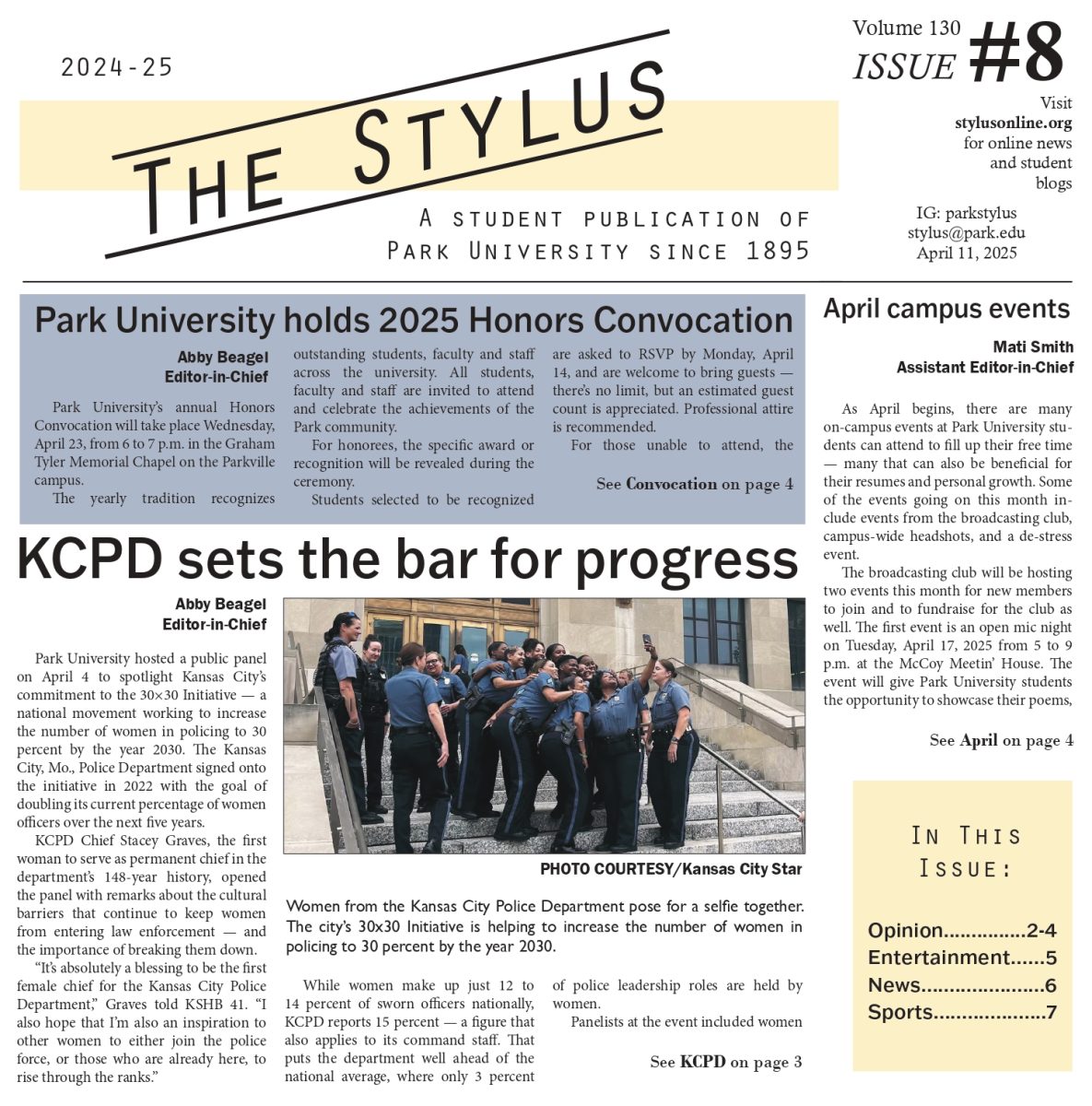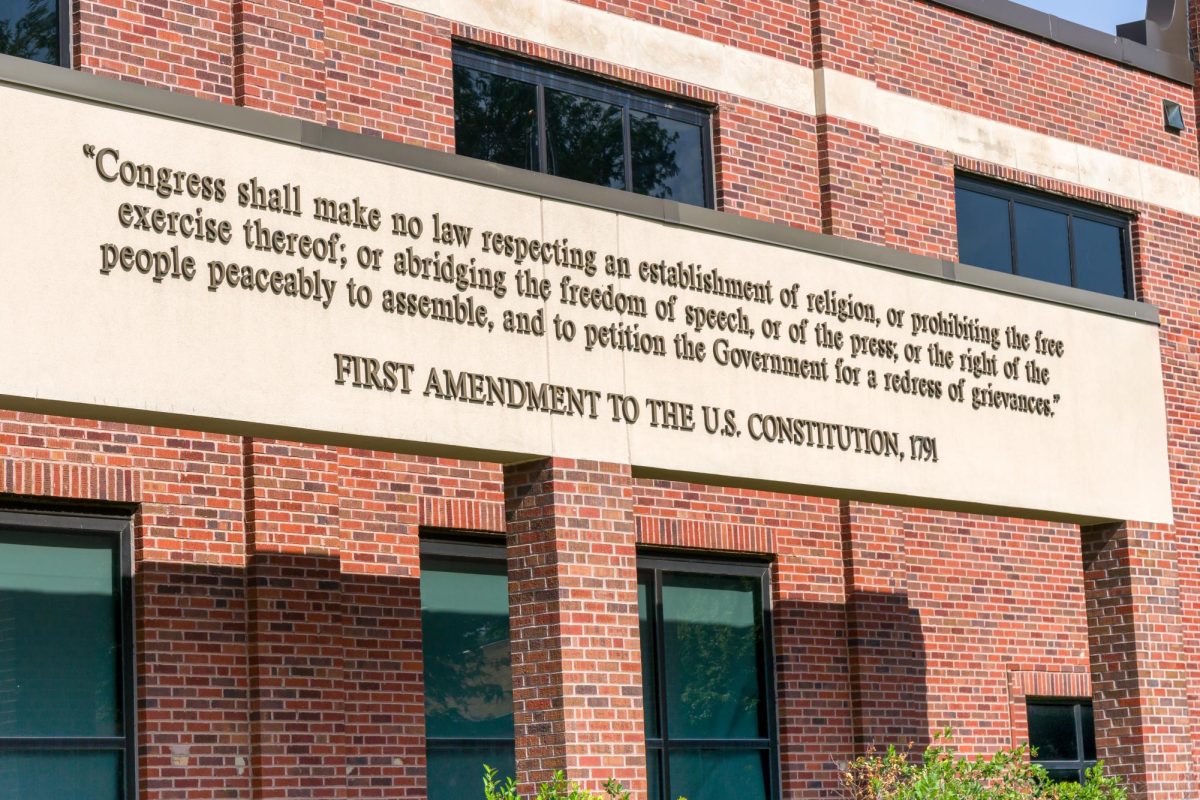Only 32.1% of Missouri high school seniors have submitted FAFSA as of March 22, 2024. This is a decrease of 8,587 from last year, according to the National College Attainment Network.
Park University went through a major retrenchment in fall of 2023, laying off faculty, cutting several low-populated programs, and closing an undisclosed number of campuses. Part of the reason for this was a decline in enrollment that predated and was exacerbated by the COVID-19 pandemic.
But what does this have to do with grade inflation? It has to do with the potential, most likely unintended, monetary incentives for lowering grading standards, both organically and intentionally, to retain as many of the diminishing students Park has as possible.
What is grade inflation? Grade inflation is a disproportional or non-linked rise in an institution’s grade point average to the actual level of mastery of content that students at the institution obtain.
According to Amelia Nierenberg, in an article from Dec. 2023 in The New York Times, “Nearly 80% of all grades given to undergraduates at Yale last year were A’s or A minuses.” Yale economics professor, Ray C. Fair, reported that G.P.A. was 3.7 in 2022, compared to a 3.6 in 2014 and 3.42 in 1999. Part of the rise came from a pandemic spike, but the spike has not been transitory, instead it has stuck around.
According to Park University’s Office of Institutional Research and Assessment, the school does not track G.P.A. for public release. This means that there is no way to statistically determine if Park is suffering grade inflation. However, much like economic inflation, people can feel its effects, even if the statistics are not available to prove the hypothesis. And there are lessons to be learned from people’s gut-feelings.
At Park University, there is a wide variety of professors and faculty who both influence and are influenced by grade inflation.
Timothy Westcott, Ph.D., chair of the Department of Culture and Society, Marine Corps veteran, has over 25 years of experience teaching at Park University. “An A in not worth the same today as it was in the past,” said Westcott. “If we went back to 1990 or 2000, students would be lining the President’s or Provost’s office complaining about the difficulties of what the professors are requiring.”
Westcott believed that grade inflation was inevitable. “The need for student retention in higher education, including Park University, has become a concern of foremost importance alongside economics, financial assistance and grade inflation,” he said. The problem originated in reaction at higher education institutions to the draft for the Vietnam War, he said. The faculty would bump up grades for young men so that they would have the G.P.A. to not be drafted. But the saving act did not end with Vietnam. It remained and has had a cascading impact on grades.
The faculty are somewhat split, with tenured professors being more likely to grade harshly than non-tenured professors, Westcott said. This creates an uneven standard for success. “If I fail a student, which I do, I have to wonder if they will learn from it and take any blame for their failure or simply leave Park and college altogether,” said Westcott.
Then the students themselves factor in. “Students think that if they pay for the class, then they should receive an A,” said Westcott. But, he stressed, it was not most students that do this. The level of academic achievement and scholarship has dipped since his tenure began, he said.
Parents are also a factor in the multi-faceted problem schools face, said Westcott. Not so much for Park, but for higher education in general, especially in the Ivy league with legacy and donor students. The parents will call and ask why their students are failing and not necessarily believe the professor when they are told their son or daughter doesn’t show up for class or turn assignments in.
Lara Cohn, Ph.D., associate professor of communication, echoed Westcott’s perspective. Cohn has been at Park for nearly two decades. Cohn believed that grade inflation was occurring at Park. “I really, truly believe that grade inflation is happening everywhere,” she said. It is not only occurring at the college level, she said, but in high schools. It was exacerbated by the COVID-19 pandemic.
“A lot of the colleges are just giving up,” Cohn said. She mentioned the multitude of schools and institutions dropping test requirements. Park has always tried to be more assessable, said Cohn, “We will meet you where you are and move you up.” But that philosophy has had some unintended consequences. When the Parkville campus removed the G.P.A. requirement for admissions, at the behest of student groups at the time of the housing crash in 2008, there was supposed to be an increase in tutoring and remedial courses, but that hasn’t happened, she said.
One of the unfortunate consequences of this has been people coming to Park because they think it’s easy, said Cohn. This is a misconception by students, and one that is detrimental to them. “There is a pressure to keep students happy,” said Cohn. This pressure results in adjuncts, especially online ones with single-year contracts, trying to avoid bad reviews from students and passing them, said Cohn. The pressure is not just relegated to adjuncts, but they face the brunt of it.
Cohn connected grade inflation to the current issue of degree deflation. “Everybody knows that you can get a business degree,” she said. And that perspective could be contributory to grade inflation and lower standards. Grade inflation is contributory to a supply and demand problem of business degrees in the marketplace, thus deflating the value of the degree.
On the other side of the coin is Suzanne Tiemann, Ph.D., chair of Undergraduate Education. She has worked in higher education for five-and-a-half years at Park but has spent a long time in primary and secondary education as both an administrator and teacher. “I don’t buy it,” she said regarding grade inflation. If grades are rising, she said, then it is only a reflection of the continuing improvement of teachers in the field of teaching.
When asked about falling literacy rates and declining math aptitude and how that squares with rising high school grades, Tiemann did not know. “Is it the content? Are we using different standards?” Perhaps, she said, we are now putting value on “critically analyzing something and getting a reasonable answer rather than the answer?” she said, “Let’s face it, in my checkbook I’m looking for a reasonable answer not the answer.”
Instead of penalizing and admonishing failure, we should embrace it for the learning experience that it is, Tiemann said. “We need to think about how to fail forward,” she said.
She believes that an A today was equivalent to an A in the past.
“There is no grade inflation at Park,” she said. A grade is a formative assessment of what the student has done, she said, but it is also a reflection on the teacher. “It is a measurement of how we’re doing.” If a student is failing, then Tiemann will do nearly everything in her power to help that student succeed. But she recognizes that students have to put some effort in. “If you will engage with me, we’re going to figure it out,” she said. The students who fail are those who do not engage.
Tiemann’s solution to grade inflation, which she doesn’t believe is happening, is to engage with students individually. “We just need to know where you are,” she said, “What do our students need to be successful and then give them that support.”
Bridging the gap between Westcott, Cohn and Tiemann is Abhijit Mazumdar, Ph.D., assistant professor of journalism. Mazumdar has been at Park for six years. “Grade inflation has occurred nationally, but has made no marked change here at Park,” said Mazumdar.
Park has many problems that Mazumdar has observed. There is no attendance policy, so students often skip class, and their grades suffer because of it, he said. The perspective of the many students who are only looking to get the degree and not focused on the learning required to get the degree means they only aspire to a C, he said. This, in conjunction with open admissions at Park, will have an adverse effect on the student body population.
Mazumdar said, “The basic requirements have come way down. We don’t expect too much from our students.” But Park was not directly experiencing grade inflation, Muzumdar said.
Grade inflation seems to be a by-product of a changing perspective on what a grade represents. For some a grade reflects the ability for a student to arrive at the correct answer. For others it is more about the process of learning, which may or may not result in a correct answer.
Martin Roberson, a sophomore secondar education major, described this dichotomy as an overcorrection of teachers trying to move away from the mind-numbing rote memorization and towards a focus on critical thinking. “Rote memorization isn’t truly learning, but at the same time, critical thinking is only useful if you arrive at correct answers,” he said.
Overall, Park is in a weird spot regarding grade inflation. Few people deny that it exists across the nation. But a dichotomy exists at Park. The tenured faculty were far more willing to grapple with the issue than the non-tenured professors.
What can truly be gathered from these perspectives is that students themselves seem to be a large part of the problem. Students will need to put more work in to earn that A, while faculty will have to resist pressure to simply pass students. Showing up to class on time and submitting assignments on time should be the bare minimum for every student, and it is not asking for much.









